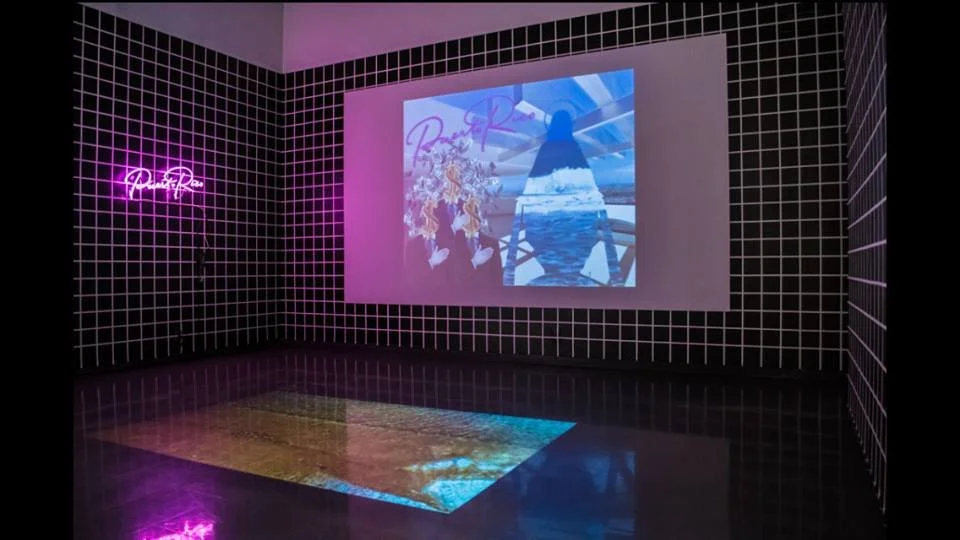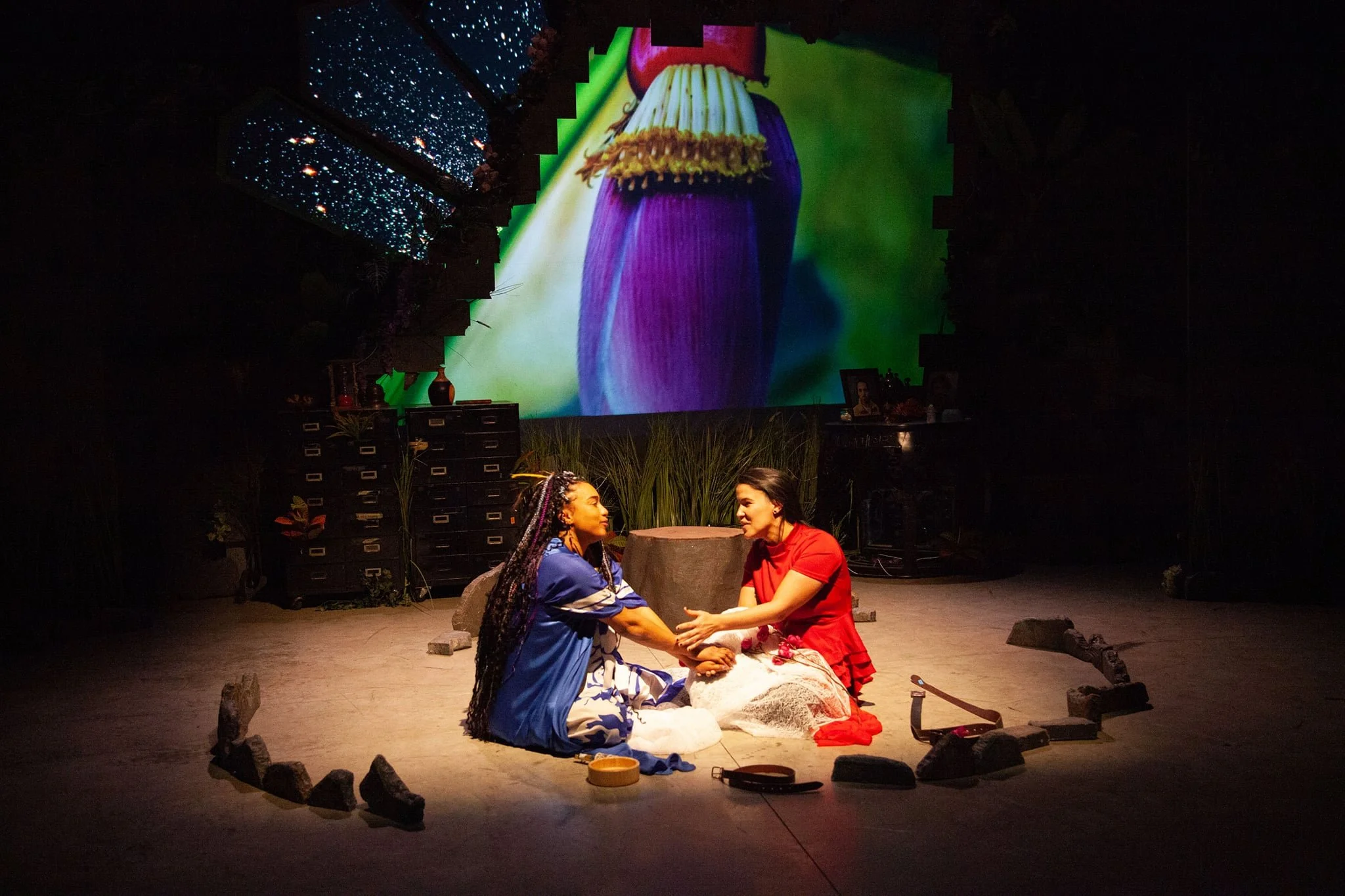New Moon Reflections of Liberation
Shey Rí Acu Rivera Ríos
“What do you think liberation means?,” a friend asked me. That's a big question. Do people ask you big questions like this?
Fantasy Island Candaleria, 2017.
I’m a creative person and maybe that’s why I am often the recipient of big questions. Artists — or creative people — are called to imagine possibilities beyond our current moment. We are also called to be so present in the current moment that living takes on a whole new level of depth. We take things in, we reflect back. And that’s when we create.
Shey Rivera & Laurie Amat in Luna Loba.
I surround myself with brilliant people who identify as artists, healers, organizers, movement workers. And the word liberation comes up in our work often. Words can be mysterious things. We can take them for granted, not bothering to take a moment to unpack them, to see what’s inside. Or to check whether we — and the people around us — have the same understanding of what they hold and how they have changed. We make mistakes when we make assumptions; when we don’t pause and make space to understand together.
This happens a lot with words like community and, most recently, decolonization. Words are pieces on a table. They can be moved, placed out of context. Their purpose changed, with or without intention. I like the idea of creating new language and I believe in the practice of not taking language for granted.
As I scroll through meaningless images on social media, I bump into a post by Liza Garza, an artist who inspires me: “shared definitions = mutual accountability”. I pause upon seeing this post. I receive it as an affirmation and expansion of my own recent reflections. Most artists are obsessed with communicating, and that’s often why we compulsively seek to create new ways, new languages across mediums. A word, a phrase, a sentence- can be a powerful bridge from me to you. Being in relationship to one another and committing to understanding each other, creates intimacy, connection, and accountability. Engaging in shared definitions is a collective practice of understanding. It is a practice of connection. And I believe it to be a practice of love.
Fantasy Island Candaleria, 2018.
Liberation is a network of fractals, pieces from everyone. This word comes with expectations, hopes, aspirations, histories, and legacies. It summons feelings, images, memories, and action. It names our oppressions while at the same time it reassures us that there are paths forward. Liberation means there is possibility, something different, something beyond our current circumstance. Liberation is Black. It is Indigenous. It is Trans and queer and disabled. Liberation is land back, it is reparations, it is loving your partner in public in the most joyous way without the fear of being killed. It is Black mothers raising their children knowing that they will be safe and supported in the world. Liberation is labor equity, it means our lives are worth more than capital. Liberation means we are enough. It means we deserve wellbeing just because we are alive. Liberation means we understand our responsibility to undo the harm we’ve caused others, ourselves, and the planet. Liberation is our commitment to each other.
This year, 2022, we are two years into the pandemic and the global movement against White supremacy. It is a time of survival and awakening. Many of us know this, we feel it in our bones. The painful shedding of snake skin, the molting of feathers, breaking of beaks and talons, to grow new. There’s a quote by Ocean Vuong that has marked me forever: “nobody’s free without breaking open”. It feels so true. This is a journey of deep awareness, a recurring practice. A ritual of breaking open.
And yes, a word can be a powerful bridge from me to you. Many of us know this. That’s why we write, why we love, why we create, why we fight for what’s just.
Photo from a performance of ANTINGONX. Photo by Erin X Smithers.
I’m part of a group of artists and organizers who come together to imagine what climate justice can look like if our people were not exhausted, drained, and harmed by capitalism and white supremacy. In challenging times, this work becomes essential: the work of imagining possibilities beyond our current circumstances. The work of galvanizing our people around those possibilities and defining the outcomes together. We imagine anti-racist systems of nurturance, we build solidarity economies, we create stories that paint a clear picture of what an abolitionist future could look like. This work is a collective practice of designing futures that center equity, justice, care, and resourcing; instead of policing, extraction, and oppression. We can nurture and deepen relationships without the need to impose ownership or harm. Love is not capital. Love is not property.
We are witnessing — and some of us are part of — a larger movement to collectively define Liberation. It is an intentional and ongoing practice of collective definitions. Of fractals. A process of becoming, of letting go. A process of deep trust in the self and in the collective. It is a process grounded in our connection to land and water. We cannot do liberatory work without centering our connection to the earth.
Photo from Milk, a performance piece by Shey Rivera.
I was born and raised in the island of Borikén and as a kid I used to spend much of my time in nature, in el monte. Those experiences remain in my body: being in relationship to the trees, the rain, the mud, the birds, the wind, the mountain. The feeling of mud on my hands, the smell of wet grass, and my feet sinking into wet soil. This is data that is forever part of my body, part of my skin. This gives me a sense of connection and belonging.
Collective meals are Liberation. Swimming in the waters of Boriken is Liberation. Dancing at an outdoor gay club under the full moon in San Antonio is Liberation. Sinking your teeth into a fresh mango, wiping drops of salt water off your face. Letting love burst open your chest and allowing it to be expansive without fear, is Liberation. Flying back to your home to join the protests that took down a corrupt governor. Witnessing queer and trans youth stepping forward to unapologetically affirm their identities and their visionary art that expands the horizons for all of us. I’m committed to this kind of Liberation. I dream of it every day. Many of us are dreaming it, building it, together. A ritual, a prayer, a spell. Fractals becoming a collective Liberation. I can see it clearly.
ABOUT THE AUTHOR
Shey 'Rí Acu' Rivera Ríos (they/them) is an interdisciplinary artist, community organizer, and arts administrator with 12 years of experience in the arts sector. As an artist, Rivera uses storytelling across mediums to create immersive worlds of magic and liberation. Rivera was born and raised in Borikén/Puerto Rico and is based in Providence, RI -land of Narragansett and Wampanoag peoples. They are the founder of Studio Loba, a storytelling lab that creates artistic and cultural projects that support social change. Learn more about them at their website, on Instagram @sheyriv and @studio.loba_, on Facebook @sheyriv, and on Twitter @SheyRiveraRios.





